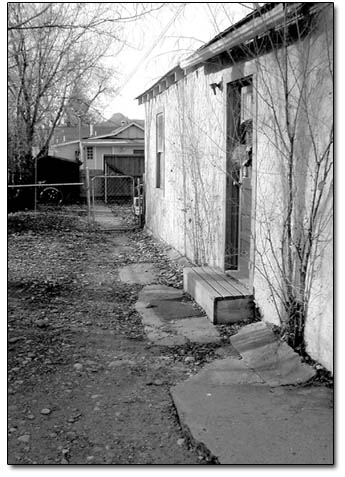 |
| Second housing units as well as homes
retrofitted to include additional apartments are the subject
of an ongoing battle between Durango homeowners and the
city. According to the city’s 1989 land-use codes,
many of these structures and additions are illegal. However,
because current laws governing such structures are ill-defined,
city officials are running into a problem in determining
which structures are illegal and which can be grandfathered
in./Photo by Will Sands. |
All over Durango, drywall is going up, plumbing
is being added, and single-family homes and their outbuildings
are becoming duplexes, triplexes and even four-plexes behind
closed doors and without official permission. However, city
of Durango officials are continuing their longstanding quest
to put an end to rogue rentals and plan to add some teeth to
regulations in the near future.
Since the adoption of Durango’s land-use code in 1989,
the city has been trying to crack down on structures it tags
as “nonconforming.” The title refers to homes and
sheds or garages that have been retrofitted to include additional
units and boost the owner’s income. Though enforcement
against such converted structures has been ongoing for more
than a decade, the city has yet to see dramatic improvement.
“Thorny issue,” “ongoing headache”
and “tough nut to crack” are all words that come
to Durango Planning Director Greg Hoch’s mind. Hoch says
that while converted homes are not on his department’s
front burner, profit prevents them from going away. “I
think in an economy and a housing market like Durango has, people
realize that real estate is a money maker,” he says. “People
also seem to think it’s easier to beg forgiveness than
ask permission.”
If they get busted, a large number of Durango residents will
be begging forgiveness and undoing their conversions. Steve
Jamnick, Durango’s code compliance officer, says that
he’s been dealing with a steady number of fly-by-night
rentals this fall, and he knows that there are many more that
have not come to his attention.
“I know there are a lot out there,” he says. “I’d
hate to even speculate on the number.”
Millisa Berry, of the City Planning Department, concurs. “There
are probably a ton out there that haven’t been turned
in. A lot of them seem to be turning up now.”
Both Berry and Hoch agree that while nonconforming units are
zoning violations, they also provide housing in a stretched
real estate market.
 “We
have a housing problem right now, and we need to remedy it somehow,”
says Berry.
“We
have a housing problem right now, and we need to remedy it somehow,”
says Berry.
Hoch adds: “The flip-side is that we’re short on
affordable units in this town. Conversions can provide relief.”
The highest incidence of nonconforming uses in Durango occurs
on the town’s historic, east side, according to the Planning
Department. That side of town carries an “RST-8”
zoning, which allows duplexes only on lots that are 7,500 square
feet or higher and have two off-street parking spaces per unit.
One Durango woman, who chose to remain anonymous, was renting
a second unit in a home that did not meet these criteria. Shortly
after she moved, she said a city inspector deduced that her
apartment was a retrofit. However, she was not thrown out on
the streets and continues to pay rent.
“I moved out for two days while they sawed through the
pipe behind the sink and got rid of the kitchen,” she
says.
She says she found the whole situation ironic, because not
only did she move back into her now legal but kitchen-free apartment,
she left her belongings and dog there for the second inspection.
Jamnick was likely the inspector who caught this non-conforming
use and says he is clued into violators in a number of ways.
“A lot of times, I look for a real estate sign in a strictly
single-family area that’s advertising a duplex for sale,”
he says. “A lot of times, I see basement apartments for
rent in single-family areas. But mostly, I react to a unit because
of complaints from neighbors.”
A local Realtor, who also chose to remain anonymous, related
a recent transaction of a duplex he was involved in. The seller
reported to him that as far as he knew the residence had traditionally
been a duplex, and it was marketed and eventually sold as a
duplex. However, after closing, the city sent the owner a letter
saying the house may be nonconforming. After an investigation,
both units are now occupied, and the agent and the home’s
owner have not heard back and are going forward on the assumption
that the duplex is legitimate. Jamnick notes that it is not
always easy to differentiate legal, long-standing construction
from recent retro-fits.
“It’s an ongoing problem with us as far as legitimizing
one from another,” he says. “It’s kind of
tough to really prove how long they’ve been there.”
However, Jamnick says he typically looks for new construction
as a tell-tale sign and says that frequently the add-ons are
made obvious by their newness.
“A lot of times it’s obvious that they were recently
constructed, and it’s obvious they skirted all the legalities,”
he says.
However, the anonymous Realtor questions: “What if it’s
an old duplex that was recently renovated?”
An additional twist comes into play with how new the construction
is. While 1989 serves as the date for land-use code adoption,
Durango first enacted zoning in 1941. Though the Planning Department
has been focusing on newer construction, the date for grandfathering
in converted structures has not been set in stone. To this end,
Hoch says that he will be sitting down with the city manager
and city attorney in the near future to gain more clarity.
Until then, the city will respond to complaints, look for flagrant
violations and focus most of its energy on bigger-ticket items
like Grandview development and developing an ordinance to encourage
dark skies.
“It’s not that it’s not an important issue
to us, it’s that our plate is full of more pressing issues,”
Hoch says.

